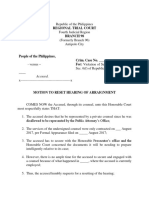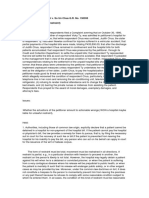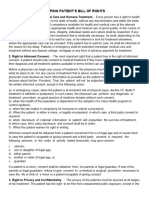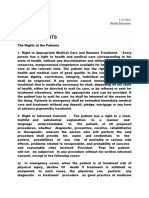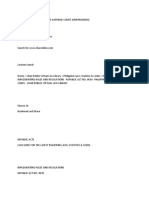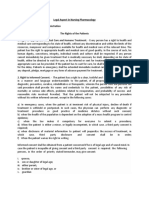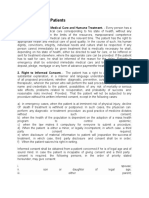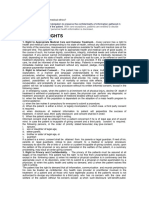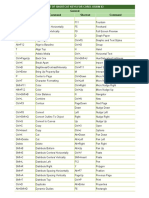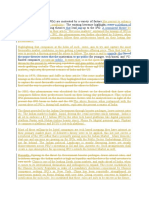Digests
Digests
Uploaded by
Jopet EstolasCopyright:
Available Formats
Digests
Digests
Uploaded by
Jopet EstolasOriginal Description:
Copyright
Available Formats
Share this document
Did you find this document useful?
Is this content inappropriate?
Copyright:
Available Formats
Digests
Digests
Uploaded by
Jopet EstolasCopyright:
Available Formats
Digests: Cases 19-26 Manila Doctors Hospital vs.
Chua and Ty (Note: pasensya na kung mahaba, importante lahat e, mahirap bawasan) Facts: Respondent Chua, mother of Ty, was admitted to petitioner hospital for hypertension and diabetes. While Chua was confined, another daughter Judith Chua was admitted for treatment of injuries sustained after a vehicular accident. Ty shouldered the hospital bills for the two. After Judith was discharged, respondent Chua remained confined. Ty was able to pay P435,800.00. The hospital bills eventually totaled P1,075,592.95. When Ty was unable to pay the bills, the hospital allegedly pressured her, by cutting off the telephone line in her room and removing the air-conditioning unit, television set, and refrigerator, refusing to render medical attendance and to change the hospital gown and bed sheets, and barring the private nurses or midwives from assisting the patient, to settle the same through the signing of a promissory note. Ty issued postdated checks to pay the note. The checks bounced. The petitioner alleged that that as early as one week after respondent Chua had been admitted to its hospital, Dr. Rody Sy, her attending physician, had already given instructions for her to be discharged, but respondents insisted that Chua remain in confinement. It also alleged that Ty voluntarily signed the agreement that she will pay the bills and that no undue pressure was exerted by them; and that the cutting-off of the telephone line and removal of the air-conditioning unit, television set, and refrigerator cannot constitute unwarranted actuations, for the same were resorted to as cost-cutting measures and to minimize respondents' charges that were already piling up, especially after respondent Ty refused to settle the balance notwithstanding frequent demands. Finally it alleged that this case was instituted by Ty to provide leverage against the hospital for filing criminal charges against the latter for violation of BP 22. Both the trial court and the CA rendered decisions in favor of the respondents finding that the removal of the facilities led to the worsening of Chuas condition. Issue: Whether or not the hospital is liable for damages. Ruling: No. The operation of private pay hospitals and medical clinics is impressed with public interest and imbued with a heavy social responsibility. But the hospital is also a business, and, as a business, it has a right to institute all measures of efficiency commensurate to the ends for which it is designed, especially to ensure its economic viability and survival. And in the legitimate pursuit of economic considerations, the extent to which the public may be served and cured is expanded, the pulse and life of the medical sector quickens, and the regeneration of the people as a whole becomes more visibly attainable. In the institution of cost-cutting measures, the hospital has a right to reduce the facilities and services that are deemed to be non-essential, such that their reduction or removal would not be detrimental to the medical condition of the patient. The lower courts decisions are results of misappreciation of the uncorroborated and self-serving evidence presented by the respondents. The evidence in the record firmly establishes that the staff of the petitioner took proactive steps to inform the relatives of respondent Chua of the removal of facilities prior thereto, and to carry out the necessary precautionary measures to ensure that her health and well-being would not be adversely affected. Also, the medical condition of respondent Chua, as consistently and indisputably confirmed by her attending physician, Dr. Rody Sy, a cardiologist, who was called as witness for both parties, whom even respondent Chua repeatedly praised to be "my doctor" and "a very good doctor" at that, and whose statements at times had been corroborated by other competent witnesses, had been "relatively well," "ambulatory," "walking around in the room," and that she was "able to leave the hospital on her own without any assistance;" that
although she complained of symptoms such as dizziness, weakness, and abdominal discomfort, Dr. Sy requested several medical examinations, such as the laboratory tests, renal tests, MRI, ultrasound, and CT scan, all of which were administered after procuring the consent of respondent Chua's family as admitted by respondent Ty herself, and even called on other specialists, such as a neurologist, endocrinologist, and gastroenterologist, to look into her condition and conduct other tests as well according to their fields of specialty, all of which yielded no serious finding. Finally, her illnesses were "lifelong illnesses" at a stage where they cannot be totally removed or abolished, making it clear to her family that "one hundred percent recovery is not possible" despite being given daily medication in the hospital. Her condition, nonetheless, is not serious, as the blood pressure is more or less controlled and within acceptable limits, "not that critical to precipitate any acute attack," nor likely to fall into any emergency, nor yet does she require continuous or prolonged hospitalization since she was stable enough to be treated at home and on an "out-patient" basis, so much so that Dr. Sy encouraged her to exercise and avoid resting all the time, and recommended that "anytime she may be discharged" even in just "two weeks after confinement," the propriety of his order of discharge concurred upon by the other specialists as well, had it not been for respondents' insistence to stay in the hospital in view of their hope for absolute recovery despite the admission of respondent Chua herself that she cannot anymore be totally cured. Authorities explicitly declare that a patient cannot be detained in a hospital for non-payment of the hospital bill. If the patient cannot pay the hospital or physician's bill, the law provides a remedy for them to pursue, that is, by filing the necessary suit in court for the recovery of such fee or bill. If the patient is prevented from leaving the hospital for his inability to pay the bill, any person who can act on his behalf can apply in court for the issuance of the writ of habeas corpus. The form of restraint must be total; movement must be restrained in all directions. If restraint is partial, e.g., in a particular direction with freedom to proceed in another, the restraint on the person's liberty is not total. However, the hospital may legally detain a patient against his will when he is a detained or convicted prisoner, or when the patient is suffering from a very contagious disease where his release will be prejudicial to public health, or when the patient is mentally ill such that his release will endanger public safety, or in other exigent cases as may be provided by law. Moreover, under the common law doctrines on tort, it does not constitute a trespass to the person to momentarily prevent him from leaving the premises or any part thereof because he refuses to comply with some reasonable condition subject to which he entered them. In all cases, the condition of this kind of restraint must be reasonable in the light of the circumstances. At any rate, as stated above, the patient is free to leave the premises, even in the ostensible violation of these conditions, after being momentarily interrupted by the hospital staff for purposes of informing him of those reasonable conditions or simply for purposes of making a demand to settle the bill. If the patient chooses to abscond or leave without the consent of the hospital in violation of any of the conditions deemed to be reasonable under the circumstances, the hospital may nonetheless register its protest and may choose to pursue the legal remedies available under law, provided that the hospital may not physically detain the patient, unless the case falls under the exceptions abovestated. Authorities are of the view that, ordinarily, a hospital, especially if it is a private pay hospital, is entitled to be compensated for its services, by either an express or an implied contract, and if no express contract exists, there is generally an implied agreement that the patient will pay the reasonable value of the services rendered; when a hospital treats a patient's injuries, it has an enforceable claim for full payment for its services, regardless of the patient's financial status. The requirement to have the relative of respondent Chua to execute a promissory note as part of the arrangement to settle the unpaid obligations is a formality that converts any implied contract into written form and, moreover, amounts to a reasonable condition, the non-fulfillment of which, in itself, however, as discussed, cannot allow the hospital to detain the patient. Contrary to the findings of the courts a quo, that such an agreement embodied in a promissory note, as well as the Contract for Admission
and Acknowledgment of Responsibility for Payment dated October 30, 1990, do not become contracts of adhesion simply because the person signing it was under stress that was not the result of the actions of the hospital, especially taking into account that there is testimony to the effect that respondent Ty signed the Promissory Note dated June 5, 1992 in the presence of counsel and acting under his advise.
RCAP vs. Executive Secretary Ermita Facts: There was a report that handwritten copies of two sets of 2006 Nursing Board examination were circulated during the examination period among examinees reviewing at the R.A. Gapuz Review Center and Inress Review Center. The examinees were provided with a list of 500 questions and answers in two of t he examinations five subjects, particularly Tests III (Psychiatric Nursing) and V (Medical-Surgical Nursing). The PRC later admitted the leakage and traced it to two Board of Nursing members. Exam results came out but Court of Appeals restrained the PRC from proceeding with the oath-taking of the successful examinees. President GMA ordered for a re-examination and issued EO 566 which authorized the CHED to supervise the establishment and operation of all review centers and similar entities in the Philippines. CHED Chairman Puno approved CHED Memorandum Order No. 49 series of 2006 (Implementing Rules and Regulations). Review Center Association of the Philippines (petitioner), an organization of independent review centers, asked the CHED to "amend, if not withdraw" the IRR arguing, among other things, that giving permits to operate a review center to Higher Education Institutions (HEIs) or consortia of HEIs and professional organizations will effectively abolish independent review centers. CHED Chairman Puno however believed that suspending the implementation of the IRR would be inconsistent with the mandate of EO 566. A dialogue between the petitioner and CHED took place. Revised IRR was approved. Petitioner filed before the CHED a Petition to Clarify/Amend RIRR praying to exclude independent review center from the coverage of the CHED; to clarify the meaning of the requirement for existing review centers to tie-up with HEIs; to revise the rules to make it conform with RA 7722 limiting the CHEDs coverage to public and private institutions of higher. In 2007, then CHED Chairman Neri responded to the petitioner that: to exclude the operation of independent review centers from the coverage of CHED would clearly contradict the intention of the said Executive Order No. 566; As to the request to clarify what is meant by tie-up/be integrated with an HEI, tie-up/be integrated simply means, to be in partner with an HEI. Petitioner filed a petition for Prohibition and Mandamus before this Court praying for the annulment of the RIRR, the declaration of EO 566 as invalid and unconstitutional exercise of legislative power, and the prohibition against CHED from implementing the RIRR. Motion to intervene filed by other organizations/institutions were granted by the Court. On 21 May 2008, CHED issued CHED Memorandum Order No. 21, Series of 2008 (CMO 21, s. 2008) extending the deadline for six months from 27 May 2008 for all existing independent review centers to tie-up or be integrated with HEIs in accordance with the RIRR. On 25 November 2008 Resolution, SC resolved to require the parties to observe the status quo prevailing before the issuance of EO 566, the RIRR, and CMO 21, s. 2008. Issues: 1. Whether EO 566 is an unconstitutional exercise by the Executive of legislative power as it expands the CHEDs jurisdiction *Yes, it expands CHEDs jurisdiction, hence unconsititutional+; and 2. Whether the RIRR is an invalid exercise of the Executives rule-making power. [Yes, it is invalid.]
Ruling: 1. The scopes of EO 566 and the RIRR clearly expand the CHE Ds coverage under RA 7722. The CHEDs coverage under RA 7722 is limited to public and private institutions of higher education and degreegranting programs in all public and private post-secondary educational institutions. EO 566 directed the CHED to formulate a framework for the regulation of review centers and similar entities. The definition of a review center under EO 566 shows that it refers to one which offers "a program or course of study that is intended to refresh and enhance the knowledge or competencies and skills of reviewees obtained in the formal school setting in preparation for the licensure examinations" given by the PRC. It does not offer a degree granting program that would put it under the jurisdiction of the CHED. A review course is only intended to "refresh and enhance the knowledge or competencies and skills of reviewees." Thus, programs given by review centers could not be considered "programs x x x of higher learning" that would put them under the jurisdiction of the CHED. "Higher education," is defined as "education beyond the secondary level or "education provided by a college or university." Further, the "similar entities" in EO 566 cover centers providing "review or tutorial services" in areas not covered by licensure examinations given by the PRC, which include, although not limited to, college entrance examinations, Civil Services examinations, and tutorial services. These review and tutorial services hardly qualify as programs of higher learning. 2. ) The exercise of the Presidents residual powers under Section 20, Title I of Book III of EO (invoked by the OSG to justify GMAs action) requires legislation; as the provision clearly states that the exercise of the Presidents other powers and functions has to be "provided for under the law." There is no law granting the President the power to amend the functions of the CHED. The President has no inherent or delegated legislative power to amend the functions of the CHED under RA 7722. The line that delineates Legislative and Executive power is not indistinct. Legislative power is "the authority, under the Constitution, to make laws, and to alter and repeal them." The Constitution, as the will of the people in their original, sovereign and unlimited capacity, has vested this power in the Congress of the Philippines. Any power, deemed to be legislative by usage and tradition, is necessarily possessed by Congress, unless the Constitution has lodged it elsewhere. The President has control over the executive department, bureaus and offices. Meaning, he has the authority to assume directly the functions of the executive department, bureau and office, or interfere with the discretion of its officials. Corollary to the power of control, he is granted administrative power. Administrative power is concerned with the work of applying policies and enforcing orders as determined by proper governmental organs. It enables the President to fix a uniform standard of administrative efficiency and check the official conduct of his agents. To this end, he can issue administrative orders, rules and regulations. An administrative order is an ordinance issued by the President which relates to specific aspects in the administrative operation of government. It must be in harmony with the law and should be for the sole purpose of implementing the law and carrying out the legislative policy. Since EO 566 is an invalid exercise of legislative power, the RIRR is also an invalid exercise of the CHEDs quasi-legislative power. Administrative agencies exercise their quasi-legislative or rule-making power through the promulgation of rules and regulations. The CHED may only exercise its rule-making power within the confines of its jurisdiction under RA 7722. But The RIRR covers review centers and similar entities. On the issue of whether RA 8981 as the appropriate law, the PRC has the power to adopt measures to preserve the integrity and inviolability of licensure examinations. However, this power should properly be interpreted to refer
to the conduct of the examinations. The power to preserve the integrity and inviolability of licensure examinations should be read together with these functions. These powers of the PRC have nothing to do at all with the regulation of review centers.
Phil. Medical Assoc. vs. Board of Medical Examiners and Torres Facts: The Board of Medical Examiners granted Jose Ma. Torres, a resident of Basilan City, a Spanish subject and a member of the Missionary Sons of the Immaculate Heart of Mary, otherwise known as the Claretian Missionaries, a license to practice medicine in the Philippines without taking any examination. The Philippine Medical Association questioned the resolution that granted such authority. Respondent was earlier granted special authority to practice medicine in Lamitan, Basilan City pursuant to Section 771(e) of the Revised Administrative Code. This authority has been granted and revoked several times in the past depending on the existence of the circumstances referred to in the law. The Board defends its grant by invoking The Treaty on the Validity of Academic Degrees and The Exercise of the Professions between the Republic of the Philippines and the Spanish State specifically Article I thereof which states: The nationals of both countries who shall have obtained degrees or diplomas to practice the liberal professions in either of the Contracting States, issued by competent national authorities, shall be deemed competent to exercise said professions in the territory of the Other, subject to the laws and regulations of the latter. When the degree or diploma of Bachelor, issued by competent national authorities allows its holder without requiring further evidence of proficiency to pursue normally higher courses of study, he shall also be deemed qualified to continue his studies in the territory of either Party in conformity with the applicable laws and regulations of the State which recognizes the validity of the title or diploma in question, and with the rules and regulations of the particular educational institution in which he intends to pursue his studies. Issue: Whether or not the grant of authority to practice medicine in the country is valid. Ruling: No. The theory of respondent cannot be accepted without placing graduates from our own educational institutions at a disadvantage vis-a-vis Spanish graduates from Spanish schools, colleges or universities. Indeed, the latter could under respondent's pretense engage in the practice of medicine in the Philippines without taking the examination prescribed in Republic Act No. 2882, whereas the former would have to take and pass said examination. Worse still, since as we ruled in the Garcia case the benefits of the aforementioned Treaty cannot be availed of in the Philippines except by Spanish subjects, the result would be should respondent's contention be sustained that graduates from Spanish schools of medicine would be entitled to practice medicine in the Philippines without examination, if they were Spanish subjects, but not if they are Filipinos. Said Treaty merely extended to diplomas issued or degrees conferred by educational institutions of Spain the same recognition and treatment that we accord to similar diplomas or degrees from local institutions of learning; that holders of said Spanish diplomas or degrees must take the examination prescribed by our laws for holders of similar diplomas or degrees from educational institutions in the Philippines.
Tablarin et al. vs. Judge Gutierrez, et al. Facts: The petitioners herein are questioning the constitutionality of administering the National Medical Admission Test (NMAT) by the Center for Educational Measurement and as required by the Board of Medical Education. They claim that the continued implementation of the law requiring the test violates the following provisions of the 1987 Constitution: (a) Article II, Section 11: "The state values the dignity of every human person and guarantees full respect of human rights." (b) Article II, Section l3: "The State recognizes the vital role of the youth in nation building and shall promote and protect their physical, moral, spiritual, intellectual and social well-being. It shall inculcate in the youth patriotism and nationalism, and encourage their involvement in public and civic affairs." (c) Article II, Section 17: "The State shall give priority to education, science and technology, arts, culture and sports to foster patriotism and nationalism, accelerate social progress and to promote total human liberation and development." (d) Article XIV, Section l: "The State shall protect and promote the right of all citizens to quality education at all levels and take appropriate steps to make such education accessible to all. " (e) Article XIV, Section 5 (3): "Every citizen has a right to select a profession or course of study, subject to fair, reasonable and equitable admission and academic requirements;" that the implementation is a violation of the constitutional principle which forbids the undue delegation of legislative power; that it is an "unfair, unreasonable and inequitable requirement," which results in a denial of due process; and that is in conflict with the equal protection clause of the Constitution. Issue: Whether or not the implementation of the NMAT is unconstitutional. Ruling: No. Petitioners have not seriously undertaken to demonstrate to what extent or in what manner the statute and the administrative order they assail collide with the State policies embodied in Sections 11, 13 and 17 of Article II. They also failed to demonstrate that the statute and regulation they assail in fact clash with the Sections referred to under Article XIV. The statute and the regulation which petitioners attack are in fact designed to promote "quality education" at the level of professional schools. When one reads Section 1 in relation to Section 5 (3) of Article XIV as one must one cannot but note that the latter phrase of Section 1 is not to be read with absolute literalness. The State is not really enjoined to take appropriate steps to make quality education "accessible to all who might for any number of reasons wish to enroll in a professional school but rather merely to make such education accessible to all who qualify under "fair, reasonable and equitable admission and academic requirements. Onto the next point, the necessary standards are set forth in Section 1 of the 1959 Medical Act: "the standardization and regulation of medical education" and in Section 5 (a) and 7 of the same Act, the body of the statute itself, and that these considered together are sufficient compliance with the requirements of the nondelegation principle. ` Again, petitioners have failed to specify just what factors or features of the NMAT render it "unfair" and "unreasonable" or "inequitable." They appear to suggest that passing the NMAT is an unnecessary requirement when added on top of the admission requirements set out in Section 7 of the Medical Act of 1959, and other
admission requirements established by internal regulations of the various medical schools, public or private. Petitioners arguments thus appear to relate to utility and wisdom or desirability of the NMAT requirement. But constitutionality is essentially a question of power or authority: this Court has neither commission nor competence to pass upon questions of the desirability or wisdom or utility of legislation or administrative regulation. Those questions must be address to the political departments of the government not to the courts. The regulation of the practice of medicine in all its branches has long been recognized as a reasonable method of protecting the health and safety of the public. That the power to regulate and control the practice of medicine includes the power to regulate admission to the ranks of those authorized to practice medicine, is also well recognized. Thus, legislation and administrative regulations requiring those who wish to practice medicine first to take and pass medical board examinations have long ago been recognized as valid exercises of governmental power. Similarly, the establishment of minimum medical educational requirements i.e., the completion of prescribed courses in a recognized medical school for admission to the medical profession, has also been sustained as a legitimate exercise of the regulatory authority of the state. What we have before us in the instant case is closely related: the regulation of access to medical schools.
The Board of Medical Education vs. Alfonso Facts: Philippine Muslim-Christian College of Medicine Foundation, Inc. failed several inspections regarding the adequacy of their school to operate a medical school. A total of five teams of inspectors ruled the school to be inadequate in all aspects of the inspection namely: college, curriculum, facilities, teaching hospital, and studentry. Accordingly, the Board of Medical Education recommended to the DECS the closure of the College. The Department followed the recommendation. The College went to court. It filed Civil Case No. 1385 in the court of respondent Judge Daniel P. Alfonso against Secretary Quisumbing in her capacity as Secretary of Education, Culture and Sports, questioning the decision as illegal, oppressive, arbitrary and discriminatory and applied for a writ of preliminary injunction to restrain its implementation. The writ was issued. The Board of Medical Education then assailed the writ as being issued with grave abuse of discretion. Issue: Whether or not the issuance was tainted with grave abuse of discretion. Ruling: Yes. The recorded facts quite clearly fail to support the College's claim of grave abuse of discretion containing the order of closure, and on the contrary convincingly show the challenged decision to be correct. From 1985, no less than five (5) surveys were conducted of respondent institution to determine its compliance with the minimum standards established for a medical college. The respondent College knew that the recommendation for its closure was made, as early as 1986, that recommendation was reiterated and reaffirmed four (4) times thereafter until it was finally approved and acted upon by the Secretary, whose action was confirmed by the Office of the President. Said respondent was given notice in June 1988, that in consequence of all these, the time for its definite closure had been unalterably set at May, 1989, a notice which was accompanied by assurances of assistance in the relocation of its students before June, 1989 and in its rehabilitation as a school for other courses. After having resorted to the whole range of administrative remedies available to it, without success, it sought to obtain from the respondent Court the relief it could not obtain from those sources, and what can only be described as a deliberate attempt to frustrate and obstruct implementation of the decision for its closure as of June, 1989 openly solicited, by newspaper advertisements or otherwise, enrollment of new and old students. Given these facts, and it being a matter of law that the Secretary of Education, Culture and Sports exercises the power to enjoin compliance with the requirements laid down for medical schools and to mete out
sanctions where he finds that violations thereof have been committed, it was a grave abuse of discretion for the respondent judge to issue the questioned injunction and thereby thwart official action, in the premises correctly taken, allowing the College to operate without the requisite government permit. A single ocular inspection, done after the College had been pre-warned thereof, did not, in the circumstances, warrant only the findings of more qualified inspectors about the true state of the College, its faculty, facilities, operations, etc. The, members of the 14 evaluating team came from the different sectors in the fields of education and medicine, and their judgment in this particular area is certainly better than that of the respondent Judge whose sole and only visit to the school could hardly have given him much more to go on than a brief look at the physical plant and facilities and into the conduct of the classes and other school activities. Respondent Judge gravely abused his discretion in substituting his judgment for theirs.
DECS vs. San Diego Facts: San Diego took the NMAT three times and flunked all three takes. He contends that he is constitutionally entitled to take the test for the fourth time. He invokes his constitutional rights to academic freedom and quality education. By agreement of the parties, San Diego was allowed to take the NMAT again, subject to the outcome of his petition. In an amended petition filed with leave of court, he squarely challenged the constitutionality of MECS Order No. 12, Series of 1972, containing the rule that an aspiring med student who flunks the test 3 times in a row is barred from taking a fourth one. The additional grounds raised were due process and equal protection. After hearing, the respondent judge declared the challenged order invalid and granting the petition. The Decision held that the petitioner had been deprived of his right to pursue a medical education through an arbitrary exercise of the police power. Issue: Whether or not the challenged order is invalid. Ruling: No. We see no reason why the rationale in the Tablarin case cannot apply to the case at bar. The issue raised in both cases is the academic preparation of the applicant. This may be gauged at least initially by the admission test and, indeed with more reliability, by the three-flunk rule. The latter cannot be regarded any less valid than the former in the regulation of the medical profession. The subject of the challenged regulation is certainly within the ambit of the police power. It is the right and indeed the responsibility of the State to insure that the medical profession is not infiltrated by incompetents to whom patients may unwarily entrust their lives and health. The method employed by the challenged regulation is not irrelevant to the purpose of the law nor is it arbitrary or oppressive. The three-flunk rule is intended to insulate the medical schools and ultimately the medical profession from the intrusion of those not qualified to be doctors. While every person is entitled to aspire to be a doctor, he does not have a constitutional right to be a doctor. This is true of any other calling in which the public interest is involved; and the closer the link, the longer the bridge to one's ambition.
PRC vs. De Guzman et al. Facts: The respondents are all graduates of the Fatima College of Medicine, Valenzuela City, Metro Manila. They passed the Physician Licensure Examination conducted in February 1993 by the Board of Medicine (Board). Petitioner Professional Regulation Commission (PRC) then released their names as successful examinees in the
medical licensure examination. Shortly thereafter, the Board observed that the grades of the seventy-nine successful examinees from Fatima College in the two most difficult subjects in the medical licensure exam, Biochemistry (Bio-Chem) and Obstetrics and Gynecology (OB-Gyne), were unusually and exceptionally high. Eleven Fatima examinees scored 100% in Bio-Chem and ten got 100% in OB-Gyne, another eleven got 99% in Bio-Chem, and twenty-one scored 99% in OB-Gyne. For its part, the NBI found that the questionable passing rate of Fatima examinees in the *1993+ Physician Examination leads to the conclusion that the Fatima examinees gained early access to the test questions. The respondents were constrained from taking oath as licensed medical doctors.
Issue: Was the act pursuant to R.A. 2382 a valid exercise of police power?
Ruling: Yes, it is true that this Court has upheld the constitutional right of every citizen to select a profession or course of study subject to a fair, reasonable, and equitable admission and academic requirements. But like all rights and freedoms guaranteed by the Charter, their exercise may be so regulated pursuant to the police power of the State to safeguard health, morals, peace, education, order, safety, and general welfare of the people. Thus, persons who desire to engage in the learned professions requiring scientific or technical knowledge may be required to take an examination as a prerequisite to engaging in their chosen careers. It is a basic rule in statutory construction that each part of a statute should be construed in connection 24 with every other part to produce a harmonious whole, not confining construction to only one section. The intent or meaning of the statute should be ascertained from the statute taken as a whole, not from an isolated part of the provision. Accordingly, Section 20, of Rep. Act No. 2382, as amended should be read in conjunction with the other provisions of the Act. Thus, to determine whether the petitioners had the ministerial obligation to administer the Hippocratic Oath to respondents and register them as physicians, recourse must be had to the entirety of the Medical Act of 1959. A careful reading of Section 20 of the Medical Act of 1959 discloses that the law uses the word "shall" with respect to the issuance of certificates of registration. Thus, the petitioners " shall sign and issue certificates of registration to those who have satisfactorily complied with the requirements of the Board." In statutory construction the term "shall" is a word of command. It is given imperative meaning. Thus, when an examinee satisfies the requirements for the grant of his physicians license, the Board is obliged to administer to him his oath 25 and register him as a physician, pursuant to Section 20 and par. (1) of Section 22 of the Medical Act of 1959. However, the surrounding circumstances in this case call for serious inquiry concerning the satisfactory compliance with the Board requirements by the respondents. The unusually high scores in the two most difficult subjects was phenomenal, according to Fr. Nebres, the consultant of PRC on the matter, and raised grave doubts about the integrity, if not validity, of the tests. These doubts have to be appropriately resolved. Section 8 of Rep. Act No. 2382 prescribes, among others, that a person who aspires to practice medicine in the Philippines, must have "satisfactorily passed the corresponding Board Examination." Section 22, in turn, provides that the oath may only be administered "to physicians who qualified in the examinations." The operative word here is "satisfactorily," defined as "sufficient to meet a condition or obligation" or "capable of dispelling 31 doubt or ignorance." Gleaned from Board Resolution No. 26, the licensing authority apparently did not find that the respondents "satisfactorily passed" the licensure examinations. The Board instead sought to nullify the examination results obtained by the respondents.
Board of Medicine vs. Yasuyuki Ota Facts: Yasuyuki Ota is a Japanese national, married to a Filipina, who has continuously resided in the Philippines for more than 10 years. He graduated from Bicol Christian College of Medicine with a degree of Doctor of Medicine. After successfully completing a one-year post graduate internship training at the Jose Reyes Memorial Medical Center, he filed an application to take the medical board examinations in order to obtain a medical license. He was required by the PRC to submit an affidavit of undertaking, stating among others that should he successfully pass the same, he would not practice medicine until he submits proof that reciprocity exists between Japan and the Philippines in admitting foreigners into the practice of medicine. Ota submitted a duly notarized English translation of the Medical Practitioners Law of Japan duly authenticated by the Consul General of the Philippine Embassy to Japan thus, he was allowed to take the Medical Board Examinations, which he subsequently passed. In spite of all these, the Board of Medicine (Board) of the PRC, in a letter dated March 8, 1993, denied respondent's request for a license to practice medicine in the Philippines on the ground that the Board "believes that no genuine reciprocity can be found in the law of Japan as there is no Filipino or foreigner who can possibly practice there. Ota filed a Petition for Certiorari and Mandamus against the Board and PRC alleging that the they, in refusing to issue in his favor a Certificate of Registration and/or license to practice medicine, had acted arbitrarily, in clear contravention of the provision of Section 20 of Republic Act (R.A.) No. 2382. Petitioners argue that while the Medical Practitioners Law of Japan allows foreigners to practice medicine therein, said document does not show that conditions for the practice of medicine in said country are practical and attainable by a foreign applicant; and since the requirements are practically impossible for a Filipino to comply with, there is no reciprocity between the two countries, hence, respondent may not be granted license to practice medicine in the Philippines. The RTC ruled in Otas favor and added that the Board had the ministerial duty to issue the certificate Ota seeks. The CA affirmed the ruling. Issue: Whether or not the respondent had sufficiently proven the existence of reciprocity between the Philippines and Japan. Ruling: Yes. R.A. No. 2382 and P.D. No. 223 allows a foreigner who has submitted competent and conclusive documentary evidence, confirmed by the Department of Foreign Affairs, showing that his country's existing laws permit citizens of the Philippines to practice medicine under the same rules and regulations governing citizens thereof (Sec. 9, RA 2382) to be a candidate to take the board examinations. Respondent submitted a copy of the Medical Practitioners Law of Japan, duly authenticated by the Consul General of the Embassy of the Philippines in Japan, which provides in Articles 2 and 11, thus:
Article 2. Anyone who wants to be medical practitioner must pass the national examination for medical practitioner and get license from the Minister of Health and Welfare. xxxx
Article 11. No one can take the National Medical Examination except persons who conform to one of the following items:
1.
Persons who finished regular medical courses at a university based on the School Education Laws (December 26, 1947) and graduated from said university. Persons who passed the preparatory test for the National Medical Examination and practiced clinics and public sanitation more than one year after passing the said test. Persons who graduated from a foreign medical school or acquired medical practitioner license in a foreign country, and also are recognized to have the same or more academic ability and techniques as persons stated in item 1 and item 2 of this article.
2.
3.
Nowhere in said statutes is it stated that the foreign applicant must show that the conditions for the practice of medicine in said country are practical and attainable by Filipinos. Neither is it stated that it must first be proven that a Filipino has been granted license and allowed to practice his profession in said country before a foreign applicant may be given license to practice in the Philippines. It is enough that the laws in the foreign country permit a Filipino to get license and practice therein. Requiring respondent to prove first that a Filipino has already been granted license and is actually practicing therein unduly expands the requirements provided for under R.A. No. 2382 and P.D. No. 223. The doctrine enunciated in PRC vs. De Guzman cannot apply in this case.
You might also like
- Patient's Bill of RightsDocument5 pagesPatient's Bill of RightsKathrinna Palo100% (3)
- Sample Petition For CorrectionDocument3 pagesSample Petition For CorrectionJopet Estolas89% (9)
- 10 Manila Doctors vs. ChuaDocument2 pages10 Manila Doctors vs. Chuargtan3100% (4)
- Motion For Permanent Dismissal and Release of Cash BondDocument2 pagesMotion For Permanent Dismissal and Release of Cash BondJopet Estolas100% (4)
- Deed of Assignment TemplateDocument3 pagesDeed of Assignment TemplateJopet EstolasNo ratings yet
- Case Digest and NotesDocument13 pagesCase Digest and NotesSherine Lagmay Rivad100% (2)
- MANILA DOCTORS HOSPITAL Vs SO UN CHUA and VICKY TYDocument8 pagesMANILA DOCTORS HOSPITAL Vs SO UN CHUA and VICKY TYMaius GaerlanNo ratings yet
- Liabilities of HospitalsDocument36 pagesLiabilities of HospitalsMJ Carreon100% (2)
- Philippine Patient's Bill of RightsDocument6 pagesPhilippine Patient's Bill of Rightsplethoraldork98% (49)
- Self-Dealing Director Sec 31 Corp CodeDocument7 pagesSelf-Dealing Director Sec 31 Corp CodeJopet EstolasNo ratings yet
- Draft - Motion To ResetDocument3 pagesDraft - Motion To ResetJopet EstolasNo ratings yet
- Electrical Notes & Articles: Minimum Electrical Clearance As Per BS:162Document5 pagesElectrical Notes & Articles: Minimum Electrical Clearance As Per BS:162Shrikanth Sola100% (2)
- Classical Guitar Digital TW-2Document10 pagesClassical Guitar Digital TW-2James BrittoNo ratings yet
- 91manila Doctors V So Un Chua (Magallon - Renelyn)Document3 pages91manila Doctors V So Un Chua (Magallon - Renelyn)RENELYN LADESMA MAGALLONNo ratings yet
- Manila Doctors Vs So Un Chua and Vicky TyDocument4 pagesManila Doctors Vs So Un Chua and Vicky TyianNo ratings yet
- Case Digest and NotesDocument13 pagesCase Digest and NotesBilton Cheng SyNo ratings yet
- Manila Doctors Hospital Vs So Un Chua and Vicky Ty) (G.R. No. 150355)Document3 pagesManila Doctors Hospital Vs So Un Chua and Vicky Ty) (G.R. No. 150355)aceploquesNo ratings yet
- Manila Doctors V ChuaDocument5 pagesManila Doctors V ChuapsilvaNo ratings yet
- Manila Doctors Hospital v. So Un Chua Et AlDocument2 pagesManila Doctors Hospital v. So Un Chua Et AlFiona FedericoNo ratings yet
- Case Digest - Legal Ethics March 5 - Manila Doctors Hospital V ChuaDocument2 pagesCase Digest - Legal Ethics March 5 - Manila Doctors Hospital V Chuamonicatilde100% (2)
- 18 - Manila Doctors Vs So Un ChuaDocument23 pages18 - Manila Doctors Vs So Un ChuasophiaNo ratings yet
- Manila Doctors Hospital vs. So Un Chua and Vicky TyDocument1 pageManila Doctors Hospital vs. So Un Chua and Vicky TyMarcusNo ratings yet
- LegmedDocument6 pagesLegmedLeigh DeeNo ratings yet
- Legal Medicine Midterms NotesDocument13 pagesLegal Medicine Midterms NotesJah JoseNo ratings yet
- Legal Medicine Midterms NotesDocument12 pagesLegal Medicine Midterms NotesJefferson MortelNo ratings yet
- وفاء الوفاءDocument5 pagesوفاء الوفاءxp1845No ratings yet
- Legal Medicine Midterms NotesDocument12 pagesLegal Medicine Midterms NotesAnne Meagen Maningas100% (4)
- Legal Medicine (Atty. Capule) - Midterm Notes (As Per Pointers)Document9 pagesLegal Medicine (Atty. Capule) - Midterm Notes (As Per Pointers)janezahrenNo ratings yet
- Medical SurgicalDocument13 pagesMedical SurgicalKrzia TehNo ratings yet
- MANILA DOCTORS HOSPITAL VDocument6 pagesMANILA DOCTORS HOSPITAL VAllen DizonNo ratings yet
- Manila Doctors Hospital v. So Un ChuaDocument39 pagesManila Doctors Hospital v. So Un ChuaGia DimayugaNo ratings yet
- Rogelio P. Nogales Et Al vs. CMC, Dr. Oscar Estrada Et Al - gr142625Document5 pagesRogelio P. Nogales Et Al vs. CMC, Dr. Oscar Estrada Et Al - gr142625Dani EsequeNo ratings yet
- Legal Medicine DigestsDocument4 pagesLegal Medicine DigestsRoyce UntalanNo ratings yet
- Manila Doctors Hospital Vs So Un Chua and Vicky TyDocument2 pagesManila Doctors Hospital Vs So Un Chua and Vicky TyArvin FigueroaNo ratings yet
- Patient's Bill of RightsDocument5 pagesPatient's Bill of RightsMenly BalofinosNo ratings yet
- Filipino Patient's Bill of RightsDocument4 pagesFilipino Patient's Bill of RightsAndrea B.No ratings yet
- Bill of RightsDocument5 pagesBill of RightsKari Kris Buenaflor IsananNo ratings yet
- Chan vs. ChanDocument2 pagesChan vs. ChanMmm GggNo ratings yet
- Patient's RightsDocument7 pagesPatient's Rightsdan.ojoy18No ratings yet
- 001 Chan Vs Chan 702 Scra 76Document10 pages001 Chan Vs Chan 702 Scra 76Maria Jeminah TurarayNo ratings yet
- July 31, 2006 MANILA DOCTORS HOSPITAL, Petitioner, SO UN CHUA and VICKY TY, Respondents. Decision Austria-Martinez, J.Document13 pagesJuly 31, 2006 MANILA DOCTORS HOSPITAL, Petitioner, SO UN CHUA and VICKY TY, Respondents. Decision Austria-Martinez, J.freakzilla_124625No ratings yet
- The Rights of The PatientsDocument3 pagesThe Rights of The PatientsZarlyn MirafloresNo ratings yet
- For Shall Of: If IsDocument5 pagesFor Shall Of: If IsMark ElbenNo ratings yet
- Dash 3Document9 pagesDash 3Dashielle GalangNo ratings yet
- Josielene Lara Chan vs. Johnny T. Chan G.R. No. 179786 July 24, 2013Document2 pagesJosielene Lara Chan vs. Johnny T. Chan G.R. No. 179786 July 24, 2013Tootsie GuzmaNo ratings yet
- Jurisprudence On Anti Detention of PatientsDocument9 pagesJurisprudence On Anti Detention of PatientsSummerRain100% (1)
- 28-Josielen Lara Chan vs. Johnny T. ChanDocument7 pages28-Josielen Lara Chan vs. Johnny T. ChanfloravielcasternoboplazoNo ratings yet
- The Patient's RightsDocument5 pagesThe Patient's RightsquesterNo ratings yet
- Patients' Bill of Rights: ATTY. Misheena Joyce C. Tiatco Practicing LawyerDocument54 pagesPatients' Bill of Rights: ATTY. Misheena Joyce C. Tiatco Practicing LawyerMJ CarreonNo ratings yet
- 7 - Nogales Vs Capitol Medical CenterDocument20 pages7 - Nogales Vs Capitol Medical Centermartina lopezNo ratings yet
- Patient Bill of RightsDocument4 pagesPatient Bill of RightsZarida ArabainNo ratings yet
- User AdmissionDocument4 pagesUser AdmissionScribdTranslationsNo ratings yet
- Liabilities of HospitalsDocument8 pagesLiabilities of HospitalsRem Alfelor100% (2)
- Legal Aspect in Nursing PharmacologyDocument63 pagesLegal Aspect in Nursing PharmacologyMarie Ashley CasiaNo ratings yet
- 11core CompetenciesDocument9 pages11core CompetenciesArthadian De PeraltaNo ratings yet
- Patients Rights 1Document1 pagePatients Rights 1Elle RomeroNo ratings yet
- Patients RightsDocument10 pagesPatients RightsAntotz LicandoNo ratings yet
- JOSIELENE LARA CHAN, Petitioner, vs. JOHNNY T. CHAN, RespondentDocument8 pagesJOSIELENE LARA CHAN, Petitioner, vs. JOHNNY T. CHAN, RespondentDagul JauganNo ratings yet
- The Rights of The PatientsDocument5 pagesThe Rights of The PatientsChristine Joy MolinaNo ratings yet
- Admission Procedure For The Critically Ill PatientDocument3 pagesAdmission Procedure For The Critically Ill Patientgeorgeloto12100% (1)
- What Is Right of Privacy in Medical EthicsDocument3 pagesWhat Is Right of Privacy in Medical EthicsMark Stephen RavelasNo ratings yet
- Patients BillDocument7 pagesPatients Billjyakit09No ratings yet
- The Slim Book of Health Pearls: The Complete Medical ExaminationFrom EverandThe Slim Book of Health Pearls: The Complete Medical ExaminationNo ratings yet
- (For Signing) Promissory Note - Twin LakesDocument3 pages(For Signing) Promissory Note - Twin LakesJopet EstolasNo ratings yet
- SEC Opinions Re Nominee DirectorsDocument6 pagesSEC Opinions Re Nominee DirectorsJopet EstolasNo ratings yet
- SEC Opinions DividendsDocument12 pagesSEC Opinions DividendsJopet EstolasNo ratings yet
- Business Judgment RuleDocument5 pagesBusiness Judgment RuleJopet EstolasNo ratings yet
- Voluntary Move Out AgreementDocument4 pagesVoluntary Move Out AgreementJopet EstolasNo ratings yet
- Authorization Letter: Unit OwnerDocument1 pageAuthorization Letter: Unit OwnerJopet EstolasNo ratings yet
- Agreement To Vacate The PropertyDocument1 pageAgreement To Vacate The PropertyJopet EstolasNo ratings yet
- Contract of LeaseDocument4 pagesContract of LeaseJopet EstolasNo ratings yet
- Notice of Order: in The Matter ofDocument1 pageNotice of Order: in The Matter ofJopet EstolasNo ratings yet
- Affidavit Damage VehicleDocument1 pageAffidavit Damage VehicleJopet EstolasNo ratings yet
- Salary Standardization LawDocument1 pageSalary Standardization LawJopet EstolasNo ratings yet
- Deed of Absolute SaleDocument2 pagesDeed of Absolute SaleJopet EstolasNo ratings yet
- Revocation OrderDocument1 pageRevocation OrderJopet EstolasNo ratings yet
- People Vs Gustafsson (Drugs)Document11 pagesPeople Vs Gustafsson (Drugs)Jopet EstolasNo ratings yet
- Resolution No. 19-2006Document7 pagesResolution No. 19-2006Jopet EstolasNo ratings yet
- Good Moral FormatDocument1 pageGood Moral FormatJopet EstolasNo ratings yet
- (Recipient) : Re: Corporate Lawyer Position, Ref: 1121Document1 page(Recipient) : Re: Corporate Lawyer Position, Ref: 1121Jopet EstolasNo ratings yet
- Thời gian làm bài: 150 phút (Trắc nghiệm 90 phút + Tự luận 60 phút), không kể thời gian giao đềDocument7 pagesThời gian làm bài: 150 phút (Trắc nghiệm 90 phút + Tự luận 60 phút), không kể thời gian giao đề6. Phạm Thanh Bình 10A4No ratings yet
- List of Shortcut Keys For Corel Draw X4Document3 pagesList of Shortcut Keys For Corel Draw X4Harvinder Singh85% (13)
- A Preliminary Exploration of The Data To Better Understand Its CharacteristicsDocument35 pagesA Preliminary Exploration of The Data To Better Understand Its CharacteristicsHasanShaikhNo ratings yet
- Specific Gravity Conversion TableDocument1 pageSpecific Gravity Conversion Tablesirio2000ve100% (1)
- CS Form No. 212 Attachment Work Experience Sheet JARIOLDocument2 pagesCS Form No. 212 Attachment Work Experience Sheet JARIOLLorraine JariolNo ratings yet
- 5992 2056en PDFDocument2 pages5992 2056en PDFtreejumboNo ratings yet
- Sharira Rachana PPT Roll No. 11-15Document17 pagesSharira Rachana PPT Roll No. 11-15Isha GuptaNo ratings yet
- Literature Review - 2024Document10 pagesLiterature Review - 2024Pratima MandadiNo ratings yet
- Workshop 2 - Ict - C1Document8 pagesWorkshop 2 - Ict - C1Karen CardozoNo ratings yet
- 2wvzq79gvycokolywolffkan 325-Sl Tower Crane NetworkDocument6 pages2wvzq79gvycokolywolffkan 325-Sl Tower Crane NetworkdjlivuNo ratings yet
- SLA 2 Science 9 Physics 4th QuarterDocument15 pagesSLA 2 Science 9 Physics 4th QuarterNymphaNarvasaDecasaNo ratings yet
- Prestressed 84-109 PDFDocument114 pagesPrestressed 84-109 PDFlui him lunNo ratings yet
- Lec08 HackML 4upDocument13 pagesLec08 HackML 4uptamsys1994No ratings yet
- Clinica Veterinara Flippervet: Biochemical Inspection ReportDocument2 pagesClinica Veterinara Flippervet: Biochemical Inspection ReportNabulski BellaNo ratings yet
- Irregular Verbs List & TranslationDocument2 pagesIrregular Verbs List & TranslationMANUELANo ratings yet
- 02.literature ReviewDocument8 pages02.literature ReviewC-Net WorksNo ratings yet
- 5.16.1.c Safety Engineer Monthly Inspection ReportDocument8 pages5.16.1.c Safety Engineer Monthly Inspection ReportTayib JabbarNo ratings yet
- 8 Oct 2018 Segments Final FinalDocument26 pages8 Oct 2018 Segments Final FinalPique LamNo ratings yet
- AA Example Layer Naming and CodingDocument5 pagesAA Example Layer Naming and CodingYasmineNo ratings yet
- Parkroyal Singapore: Case StudyDocument20 pagesParkroyal Singapore: Case StudyHARSH VARDHAN SINGH100% (1)
- NBS ManifestoAndConstitutionDocument29 pagesNBS ManifestoAndConstitutionAnand SinghNo ratings yet
- KHZ M&e A6-1 e LV Ru 02Document1 pageKHZ M&e A6-1 e LV Ru 02amirul aizadNo ratings yet
- Acetaminophen Analgesia in Neonatal Circumcision: The Effect On PainDocument8 pagesAcetaminophen Analgesia in Neonatal Circumcision: The Effect On PainDaud GultomNo ratings yet
- Calculator 2018Document59 pagesCalculator 2018mitulNo ratings yet
- Miraflex CatalogueDocument12 pagesMiraflex Cataloguekishore13No ratings yet
- S Many A Plethora of That Ing A Prominent TheoryDocument4 pagesS Many A Plethora of That Ing A Prominent TheoryManan DuggalNo ratings yet
- Degree of ComparisonDocument12 pagesDegree of ComparisonRoni Rahmad siregarNo ratings yet
- Root Disk Mirroring On Debian LinuxDocument20 pagesRoot Disk Mirroring On Debian LinuxTedy TirtawidjajaNo ratings yet










